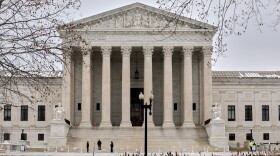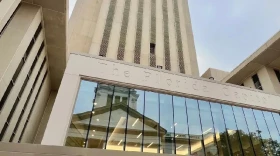About three years ago, Captain Allen Walburn of A&B Charters in Naples learned that to renew the federal fishing permit he needed to run his business, he would be required to install a tracking device on the vessel. The device would send all sorts of data back to the National Oceanic and Atmospheric Administration, or NOAA.
“Charter boats that are allowed to fish in federal waters in the Gulf of Mexico are required to have a federal fishing permit that's issued by NOAA on an annual basis,” Walburn said. “And we're compelled by the terms and conditions of this permit to abide by those rules and regulations. About three years ago, they came down with a ruling that said we would be required to purchase and install vessel monitoring devices–-tracking devices.”
He was already reporting when the vessel left and returned to the dock for each journey, how many people were aboard, and the amount and type of fish they caught.
Now, he was going to have to report all that plus how much they charged each passenger, how much they spent for gas and bait, and critically to Walburn, where exactly he was catching fish.
“I'm just against government intrusion in our lives,” said Walburn. “I don't have any problem telling them how many fish we catch and that sort of thing. But think about this. What makes a good fisherman? He has his own private fishing spots. Right? When I go out and find a really good fishing spot, or I go out and make a really good fishing spot. I don't want everybody in the world to know about it.”
This ruling was forcing Walburn to disclose where he found fish—proprietary information and the bread and butter of a charter boat captain’s business.
Walburn had read about a similar case in New England, where commercial fishing boats were required to have human monitors on board. So he got in touch with the New Civil Liberties Alliance, or NCLA, the same group that had worked on the New England case.
Senior Litigation Counsel John Vecchione says the NCLA is “like the ACLU, but more on administrative law.” It’s a nonprofit organization, he goes on to say, that sues administrative agencies over actions the NCLA deems unconstitutional.
Vecchione says that NOAA claimed the rule was in place to doublecheck the comings and goings of the charter boats.
The rule, and the subsequent court case, applied only to boats that were 30-40 feet and usually serving small businesses. And based on how fisheries are legislated in this country, it applied only to vessels in the Gulf of Mexico.
NOAA claimed that the monitoring was lawful because charter boat fishing was what is known as a “closely regulated industry,” meaning they could be inspected at any time.
“There's an exception to constitutional rights called the closely regulated industry, meaning the Supreme Court says things like firearms and explosives have been closely regulated, so we can go inspect them at any time,” said John Vecchione. “And the court said, we are not going to expand that exception to every industry in this country and certainly not charter boat captains. You still have to comply with the Constitution.”
Translation? The courts set aside NOAA’s rule requiring 24-hour GPS tracking of recreational charter boat fishing vessels and reporting of confidential economic data.
The fishing boat captains hope this means they can soon remove the tracking devices from their vessels.
“Well, I just didn't like the fact that they were tracking my boat, 24 hours a day, seven days a week when, you know, at least 75% of the time to boats for private use,” said Walburn.
“Big brother doesn’t need to be watching over us.”
WGCU is your trusted source for news and information in Southwest Florida. We are a nonprofit public service, and your support is more critical than ever. Keep public media strong and donate now. Thank you.





